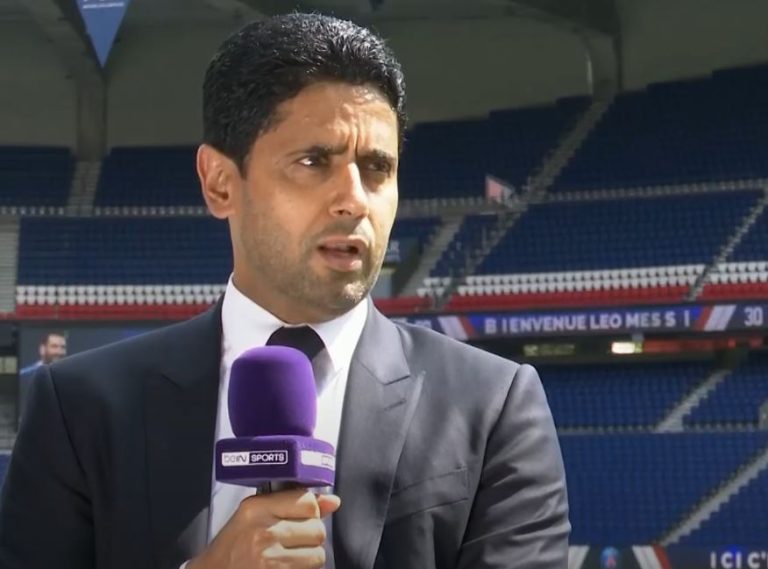From a little-known tennis player to a major player in international sport, Nasser Al-Khelaifi’s journey demonstrates an incredibly clear vision backed by calculated partnerships. His carefully constructed businesses, such as his media empire and Paris Saint-Germain’s explosive rise under his leadership, have contributed to his wealth, which was recently estimated to be close to $9 billion.
Despite being the son of a pearl diver and growing up in Doha, Al-Khelaifi made quick progress in Qatar’s educational and athletic systems. He retired in 2004 after playing professional tennis for more than ten years and representing Qatar in the Davis Cup. He was personally chosen to head Qatar Sports Investments (QSI), the company in charge of buying PSG, in 2011. This decision was incredibly successful in introducing him to the world of professional sports.
| Attribute | Detail |
|---|---|
| Full Name | Nasser bin Ghanim Al-Khelaifi |
| Date of Birth | November 12, 1973 |
| Birthplace | Doha, Qatar |
| Height | 1.80 m |
| Education | Qatar University (Econ.), University of Piraeus (Postgrad) |
| Former Career | Professional Tennis Player |
| Current Positions | Chairman – beIN Media Group, PSG President, Head – Qatar Sports Investments |
| Estimated Net Worth | $8–9 Billion |
| Family | Married to Ghada R. Al-Khelaifi |
| Source | Wikipedia – Nasser Al-Khelaifi |
Since that purchase, Paris Saint-Germain has changed not only as a team but also as a soft power symbol that is ready for the media and has a ton of merchandise. From building a global fan base to acquiring Neymar in a record-breaking transfer, PSG’s ascent has greatly increased Al-Khelaifi’s assets and influence. These advancements were not only tactical; they were also very creative and in line with Qatar’s larger goal of using sport to establish a global presence.
Additionally, beIN Media Group has grown into a financial powerhouse over the last ten years. Football, tennis, and motorsports broadcasting rights acquired by beIN have greatly increased his income. BeIN maintains control over valuable sports content in dozens of regions through strategic partnerships and market-specific licensing, solidifying Al-Khelaifi’s standing as one of the most influential media moguls in sports.
A very effective structure supports a large portion of his net worth. His businesses are supported by Qatar’s substantial state capital rather than debt or short-term funding. Scalability and security are thus guaranteed. As a result, even during times of legal or reputational pressure, his business model has proven remarkably resilient.
Al-Khelaifi has come under increasing public scrutiny in recent years. There have been claims of financial irregularities, vote manipulation, and corporate wrongdoing. He has escaped conviction on significant charges, but some allegations have prompted investigations, most notably in Switzerland. Despite harming his reputation, these cases haven’t really slowed his financial progress. After every controversy, his empire’s resilience has significantly increased because of its diverse holdings and steady institutional support.
Al-Khelaifi has created a vertically aligned structure where content production and distribution reinforce one another by integrating media assets with club operations. PSG creates news stories. They are broadcast on beIN. The pipeline is financed by sponsorships. Particularly in a time when global branding, entertainment, and sport all converge, this ecosystem has shown itself to be immensely adaptable.
Al-Khelaifi rarely pursues attention, in contrast to many billionaires who thrive on it. He stays away from social excess and tabloid features. Not even his wife Ghada and their kids are in the spotlight. This discretion is remarkably similar to the financial minimalism observed in other long-term sports entrepreneurs, despite the fact that it is rarely discussed.
According to financial analysts, his empire is exceptionally strong. As beIN continues to expand throughout Asia and Africa, its next phase is probably going to concentrate on digital platforms and on-demand experiences. In contrast, PSG is expected to be valued at more than $1.5 billion by 2026, especially as branded content and youth development programs gain popularity.
PSG’s business relationships have changed significantly in the last few seasons. Agreements with Dior, Jordan Brand, and Crypto.com have increased revenue and relevance. In addition to increasing Al-Khelaifi’s revenue, these collaborations have been incredibly successful in revitalizing the team’s image among Gen Z supporters. Essentially, he is curating culture in addition to making money off of sports.
Al-Khelaifi still occupies significant positions in the upper echelons of European football despite political criticism and legal investigations. His presence influences decisions ranging from club licensing to tournament revenues as the chairman of the European Club Association and a member of UEFA’s executive committee. These positions are more than just ceremonial; they provide access, power, and knowledge of the upcoming changes in the sports industry.
Al-Khelaifi has established an empire that operates noticeably more quickly than its rivals thanks to strategic leadership and purposeful restraint. His ability to combine media, investment, and sports shows not only business acumen but also a unique capacity to recognize global trends and take decisive action. Nasser Al-Khelaifi continues to be one of the most lucid examples of sustained, state-aligned financial growth for scholars examining the relationship between contemporary wealth and international sports.


